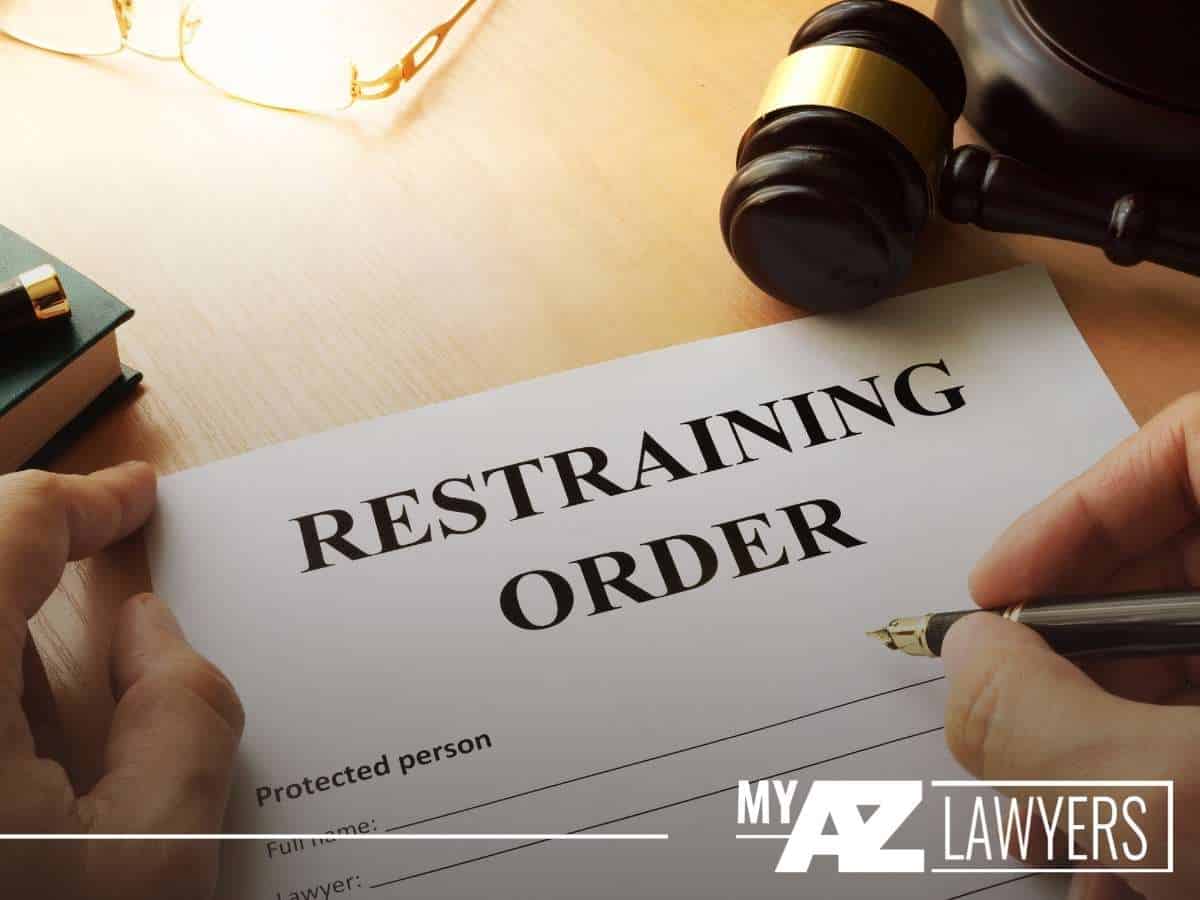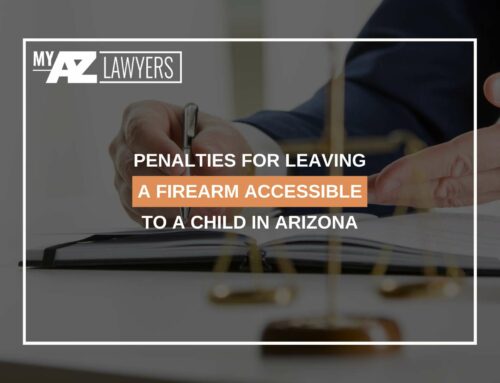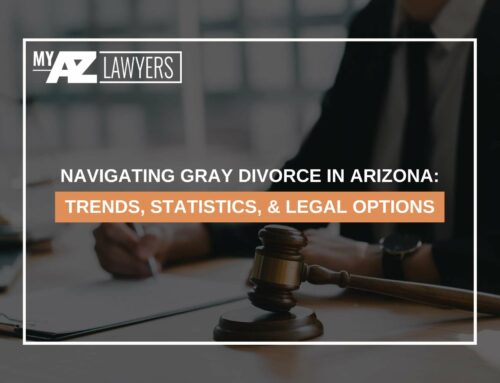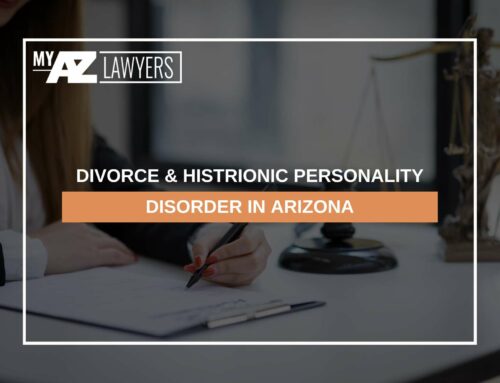Table Of Contents
Steps To Getting a Restraining Order In Arizona
How To Get a Restraining Order In Arizona
Seeking out a restraining order is a scary process. Court procedures are intimidating, and maybe even overwhelming, for most people who don’t make a career of it. On top of that, you could be facing harassment or attacks by the person from whom you are seeking protection. But when you are seeking any type of restraining order in Arizona, it’s important that you go about the process carefully. If you make mistakes when petitioning the court, it could cause delays and potentially antagonize your harasser. Whether your restraining order is in conjunction with a divorce or a standalone legal matter, we recommend seeking out the guidance of an experienced Arizona family law attorney. Call 480-470-1504 to schedule your free consultation with a member of our Arizona legal team today.

Restraining Orders in Arizona
There are two types of restraining orders in Arizona: orders of protections and injunctions against harassment. Orders of protection are used to protect yourself from someone with whom you share a close relationship- examples include relatives, roommates, and current and former romantic partners. Injunctions against harassment are used for everyone else, including friends, neighbors, and even strangers. An injunction against workplace harassment does just what it sounds like, and prevents harassment between coworkers, bosses, and more. All types of restraining orders can be used to bar the defendant from contacting the plaintiff or going to their home, school, job, etc. A protective order can prevent a defendant from legally owning a firearm. The defendant can be arrested for violating the restraining order, regardless of whether their conduct would otherwise be illegal.
Reasons to Seek a Restraining Order
A restraining order can be sought under several circumstances in Arizona. These acts are generally considered domestic violence if they are committed by someone with whom you have an intimate relationship. A judge should grant your request for a restraining order if the defendant has committed any of the following acts against you:
- Threatening or intimidating
- Custodial interference
- Kidnapping
- Sexual assault
- Criminal trespass
- Criminal damage
- Disorderly conduct
- Cruelty to animals
- Harassment
- Stalking
- Unlawful imprisonment
- Surreptitious photographing or videotaping
- Child abuse
- Vulnerable adult abuse
Steps To Obtaining a Restraining Order in Arizona
Ideally, you will be able to reach out to an attorney before beginning the restraining order process in Arizona. However, cost can sometimes be an issue, as well as having the opportunity to discreetly reach out to attorneys without the abuser’s knowledge. Our office offers free initial consultations and can handle your case with discretion if necessary- click here to let us know more about your situation.
Next, you should fill out your petition requesting a protective order from the court. You can do this using AZPOINT, or the Arizona Protective Order Initiation & Notification Tool. If you hire a Glendale family law attorney, they will handle this part of the process. After completing your AZPOINT paperwork, you will go to the courthouse in which you wish to file your case. If you have an active family law case with the defendant, you must file your petition for a protective order in that courthouse. A judge will review your petition, and you will appear before the judge to answer questions about your situation.
Based on this appearance, the judge will decide whether to grant the petition for a protective order. If it is granted, the defendant must be served with the protective order by a process server or sheriff. Keep a copy of the protective order with you at all times until the defendant has been served.
Arizona Restraining Order Frequently Asked Questions
Q: How much does it cost to file a restraining order with the court?
A: Arizona law requires that there be no fees associated with seeking a protective order. The only exception is that an employer may have to pay a fee to file an injunction against harassment against an employee. There are fee waiver applications available for employers who can’t afford the filing fee.
Q: How long does a restraining order last?
A: Once a protective order is issued, it needs to be served upon the defendant within 1 year. The protective order will last 2 years from the date of service upon the defendant.
Q: Can I include my children on my protective order?
A: Children, as well as other family members, can be included in your request to the court for a protective order. You must be sure to list your child’s school, extracurricular activities, or any other places that could be relevant with an additional person to protect. The judge may be more likely to request that the additional person be in attendance at any hearings if that person is at least 18 years old. Keep in mind that including your child on a protective order won’t override any court-ordered parenting plans.
Q: What happens if the defendant violates the protective order?
A: Violating a protective order is a crime in Arizona, and a defendant can be charged with interference with a judicial proceeding for doing so. This is a class one misdemeanor, which comes with serious penalties. The charges can eventually increase to felony status if the defendant repeatedly violates the order. Felonies come with serious prison time, fines, and the loss of certain civil rights.
Q: Can the plaintiff violate the protective order?
A: A protective order is not a weapon to offensively use against the defendant. It is meant to protect from harmful conduct by the defendant, but not to hunt down the defendant to try to land them in jail. For example, a plaintiff can’t show up to pick up a shared child on the defendant’s assigned day, then call the police to say the defendant is violating the restraining order. Otherwise, the plaintiff could face similar penalties as the defendant would for actually violating the order.
Q: Can the defendant fight the restraining order?
A: The defendant has the right to request a hearing to fight the restraining order at any time that it is in effect. The hearing must be held within 5-10 days of the defendant’s request. Both parties will be notified of the hearing and have the opportunity to present evidence about why the order should remain in place or be terminated. Neither party will be provided a court-appointed attorney but have the option to bring their own privately retained attorney.
Q: What if I share a residence with the defendant?
A: You can request exclusive use of the residence when filling out your petition. If you are granted exclusive use of the home, you must notify the court if you move out of the residence while the protective order is active.
Q: Can a restraining order be modified?
A: Both the plaintiff and defendant can request that a restraining order be modified. The judge will hold a hearing on the matter if the request is filed properly. A judge may also make a modification if child custody is at issue.
Reliable, Budget-Friendly Arizona Legal Representation
Whether you need to request a restraining order or fight one, the attorneys at My AZ Lawyers have the skillset to obtain the results you need. A high quality attorney could make the difference between your request to the court being granted or denied. But you don’t need to pay an arm and a leg to receive the type of legal services that you deserve. Call 480-470-1504 to schedule your free consultation with an experienced member of our Arizona law firm.
LISTEN TO THE PODCAST VERSION OF THIS ARTICLE
Arizona Offices:
Mesa Location:
1731 West Baseline Rd., Suite #100
Mesa, AZ 85202
Office: (480) 448-9800
Email: info@myazlawyers.com
Website: https://myazlawyers.com/
Phoenix Location:
343 West Roosevelt, Suite #100
Phoenix, AZ 85003
Office: (602) 609-7000
Glendale Location:
20325 N 51st Avenue Suite #134, Building 5
Glendale, AZ 85308
Office: (602) 509-0955
Tucson Location:
2 East Congress St., Suite #900-6A
Tucson, AZ 85701
Office: (520) 441-1450
Avondale Location:
12725 W. Indian School Rd., Ste E, #101
Avondale, AZ 85392
Office: (623) 469-6603














